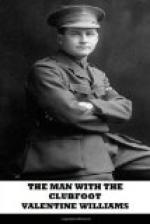He brought his remarks to this abrupt anticlimax so suddenly that I was taken aback. The man was watching me intently for all his apparent nonchalance, and I felt more than ever the necessity for being on my guard. If I could only fathom how much he knew. Of two things I felt fairly sure: the fellow believed me to be Semlin and was under the impression that I still retained my portion of the document. I should have to gain time. The bargain he proposed over my half of the letter might give me an opportunity of doing that. Moreover, I must find out whether he really had the other half of the document, and in that case, where he kept it.
He broke the silence.
“Well, Herr Doktor,” he said, “do you want me to start the bidding? You needn’t be afraid. I am generous.”
I leant forward earnestly in my chair.
“You have spoken with admirable frankness, Herr Doktor,” I said, “and I will be equally plain, but I will be brief. In the first place, I wish to know that you are the man you profess to be: so far, you must remember, I have only the assurance of our excitable young friend.”
“Your caution is most praiseworthy,” said the other, “but I should imagine I carry my name written on my boot.” And he lifted his hideous and deformed foot.
“That is scarcely sufficient guarantee,” I answered, “in a matter of this importance. A detail like that could easily be counterfeited, or otherwise provided for.”
“My badge,” and the man produced from his waistcoat pocket a silver star identical with the one I carried on my braces, but bearing only the letter “G” above the inscription “Abt. VII.”
“That, even,” I retorted, “is not conclusive.”
Clubfoot’s mind was extraordinarily alert, however gross and heavy his body might be.
He paused for a moment in reflection, his hands crossed upon his great paunch.
“Why not?” he said suddenly, reached out for his cigar-case, beside him on the table, and produced three slips of paper highly glazed and covered with that unforgettable, sprawling hand, a portion of a gilded crest at the top—in short, the missing half of the document I had found in Semlin’s bag. Clubfoot held them out fanwise for me to see, but well out of my reach, and he kept a great, spatulate thumb over the top of the first sheet where the name of the addressee should have been.
“I trust you are now convinced, Herr Doktor,” he said, with a smile that bared his teeth, and, putting the pieces together, he folded them across, tucked them away in the cigar-case again, and thrust it into his pocket.
I must test the ground further.
“Has it occurred to you, Herr Doktor,” I asked, “that we have very little time at our disposal? The person whom we serve must be anxiously waiting....”
Clubfoot laughed and shook his head.
“I want that half-letter badly,” he said, “but there’s no violent hurry. So I fear you must leave that argument out of your presentation of the case, for it has no commercial value. The person you speak of is not in Berlin.”




